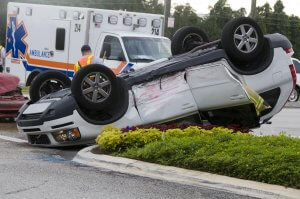
In March 2018, a woman crossing the street in Tempe, Arizona was fatally struck by a Volvo SUV. That SUV was an Uber self-driving test vehicle, and the collision set off a wave of safety concerns. Uber halted its self-driving vehicle program, and other manufacturers pulled back on their plans. Eight months later, Uber says it’s ready to start testing again.
In a letter to the National Highway Traffic Safety Administration (NHTSA), Uber revealed that it plans to restart autonomous vehicle testing soon. After it grounded its autonomous fleet, the company underwent an internal safety review. Following that review’s recommendations, it has implemented several measures to improve safety during self-driving vehicle tests.
What Are Uber’s New Safety Measures for Autonomous Vehicle Testing?
Uber will utilize two safety drivers during testing. Drivers will be monitored in real-time by a third-party. The company will also begin activating the factory-installed autonomous braking that comes on the Volvo XC90 test vehicles. Previously, Uber would deactivate this factory feature to reduce erratic stopping.
The company has also redesigned the software its autonomous vehicles use. In a report to the National Transportation Safety Board, Uber revealed that its system had registered the Arizona woman six seconds before the crash. However, the system couldn’t identify the woman and didn’t decide to brake until 1.3 seconds before the crash. The company now claims that the software can identify objects and people faster. The company also says that the new software will take appropriate measures even if it cannot identify an object.
What Safety Concerns Remain Unanswered?
Are these new measures enough to ensure the public’s safety? Will Uber and other self-driving vehicle developers be held responsible for the damage they cause? The family of the Arizona pedestrian who lost her life filed a lawsuit that Uber settled in just a few short days. Quick settlements have been the trend among the makers of autonomous vehicles. Some analysts believe these settlements are the result of companies trying to avoid courtroom rulings that could lead to federal regulations. But that hasn’t stopped lawmakers from scrutinizing this fast-growing industry.
A few weeks ago, we discussed the American Vision for Safer Transportation through Revolutionary Technologies (AV START) Act. This legislation would have allowed manufacturers to test their autonomous vehicle technology on public roads with fewer restrictions. However, in light of recent events, automaker warnings and public outcry, the bill stalled in the Senate. Now, lawmakers are starting to increase the attention they put on these high-tech firms, and we could soon see a new set of federal laws aimed at improving the public’s safety.
The attorneys at Polinsky Law Group, LLC are focused on helping individuals injured in car accidents. Whether your accident was caused by a distracted driver, or a glitching computer, don’t be afraid to contact us for help.

